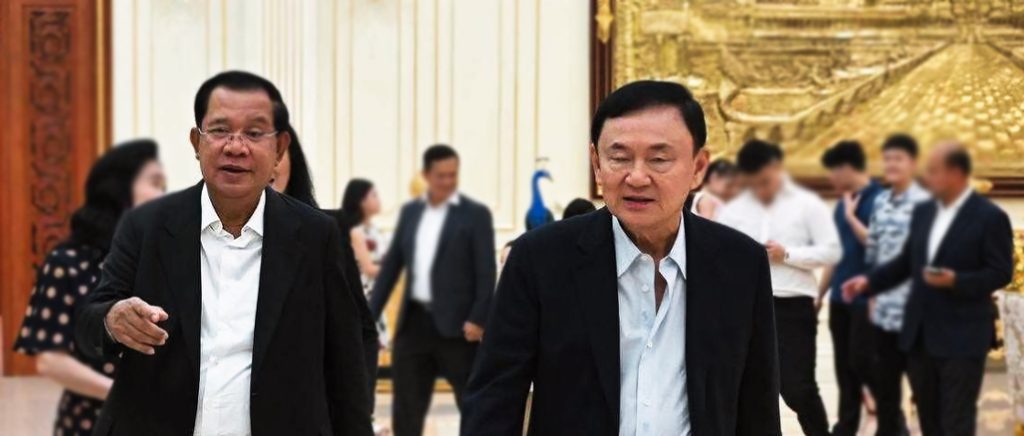The recent political developments orchestrated by Thaksin Shinawatra in Thailand, including his return from exile, strategic alliances, and the election of a Prime Minister from his party, pose a significant threat to Thai constitutional law and the rule of law. Thaksin’s strategic alliances with former military rivals, and the subsequent election of a Prime Minister from his party, the Pheu Thai Party, have ignited debates about the fragility of democratic institutions in Thailand. Drawing parallels with Pakistan’s historical challenges, particularly in military intervention and constitutional manipulation, highlights the gravity of the situation. Both nations share a history of recurrent military interventions, underscoring the need for international engagement to safeguard democratic values globally.
Thaksin’s Machiavellian Moves
Thaksin Shinawatra’s return to Thailand after more than 15 years in exile marked a pivotal moment in the country’s political landscape. His immediate arrest and subsequent sentencing by the Supreme Court for past offences indicated a contentious relationship between the political elite and the judiciary. However, the real intrigue unfolded in the subsequent political events.
In light of these events, the coalition between the Pheu Thai Party and its former military rivals and Pro-royalists, including the Palang Pracharath Party and United Thai Nation Party, raised eyebrows and fuelled suspicions of a behind-the-scenes deal. This coalition, however, excluded the reformist Move Forward Party, indicating a strategic move by Thaksin to secure power by aligning with forces that had previously seized power from him. The election of Srettha Thavisin as Prime Minister, despite his party finishing second in the May elections, further underscored the complexity of the political manoeuvring orchestrated by Thaksin.
Constitutional Quagmire
Delving into the constitutional implications, both Thailand and Pakistan grapple with recurring challenges, notably military interventions disrupting constitutional norms. Thaksin’s adeptness in striking deals with former military rivals to secure political power mirrors instances in Pakistan’s history where military influence has shaped constitutional trajectories. The Thai Constitution of 2017, akin to its counterpart in Pakistan, has provisions allowing Senators to be appointed without the direct mandate of the people, creating potential loopholes for political manoeuvring. This was evident in the recent coalition formation where strategic alliances with military-backed parties played a crucial role, reflecting a hesitancy to challenge existing power structures.
Thailand’s constitutional order has faced repeated challenges, with military interventions becoming a recurring theme. Thaksin’s ability to strike deals with former military rivals and secure the premiership for his party highlights a concerning trend – the erosion of constitutional norms in favour of political expediency.
Tipping into Authoritarian Shadows
Thaksin’s exclusion of the Move Forward Party and alignment with military-backed forces raises concerns about the autonomy of democratic institutions, mirroring episodes in Pakistan where strategic alliances have tilted the balance towards authoritarian shadows. The international community’s role in discouraging such manipulations finds resonance in global responses to similar challenges faced by Pakistan.
By scrutinising these specific parallels, we uncover a shared narrative of constitutional challenges, illuminating the intricate similarities between Thailand and Pakistan’s political landscapes. Thaksin’s manoeuvres, seemingly unique to Thailand, find echoes in the historical pages of Pakistan’s constitutional struggles, emphasising the universal relevance of safeguarding democratic values.
Thaksin’s actions, while ostensibly aimed at securing power for his party, pose a significant threat to the democratic fabric of Thailand. The exclusion of the Move Forward Party, which won the most votes and seats in the May general election, from the coalition indicates a disregard for the will of the people. Moreover, the willingness to align with military-backed parties raises questions about the autonomy of democratic institutions.
The international community has a crucial role to play in discouraging such manipulations of democracy. Diplomatic pressure, sanctions, and international condemnation should be employed when democratic processes are subverted. The global commitment to democratic values necessitates a unified stance against actions that undermine the principles of democracy.
To reinforce the connection between Thaksin’s actions and the erosion of democratic values, strengthen the concluding sentence of this section by explicitly highlighting the potential consequences. Emphasise how these actions not only threaten the immediate democratic process but also have long-term implications for the overall health and resilience of democratic institutions in Thailand.
Shared Script of Political Turmoil
Thaksin Shinawatra’s return to Thailand after over 15 years in exile mirrors the return of political figures in Pakistan amid periods of constitutional uncertainty. His immediate clash with the judiciary, symbolised by his arrest and sentencing by the Supreme Court, echoes historical tensions between political elites and the judiciary in Pakistan.
The parallels between Thailand and Pakistan unfold as a shared script of political turmoil, echoing through the corridors of constitutional challenges. Thaksin Shinawatra’s strategic moves in Thailand bear an uncanny resemblance to chapters in Pakistan’s history marked by military interventions and constitutional upheavals. It is potent to dissect these parallels to unravel the constitutional threads that tie these nations together.
The engagement of the international community is crucial for encouraging positive change in both countries. The use of diplomatic pressure, sanctions, and international condemnation can serve as a cheque on the actions of military rulers and reinforce the global commitment to democratic values. By drawing parallels between Thailand and Pakistan, it becomes evident that the erosion of democratic institutions has far-reaching consequences that extend beyond national borders.
Thaksin’s strategic moves may have secured short-term political gains, but the long-term implications for Thai democracy are alarming. The consolidation of power within a network of political elites, including military figures, threatens the principles of democracy, transparency, and accountability. The exclusion of reformist parties like Move Forward from the coalition raises concerns about the government’s commitment to bold reforms and the push to remove military influence from politics.
The enduring tension between civilian governments and the military, as seen in both Thailand and Pakistan, creates a cycle of instability that hinders democratic consolidation. The perpetual turmoil not only erodes democratic institutions but also inflicts severe economic setbacks, hinders human rights, and tarnishes international reputations.
Conclusion
In a nutshell, the recent political developments in Thailand orchestrated by Thaksin Shinawatra indeed cast a shadow over the nation’s democratic foundations. The intricate parallels drawn between Thailand and Pakistan, both grappling with historical challenges of military intervention and constitutional manipulation, underscore the fragility of democratic institutions in the face of political expediency. Thaksin’s Machiavellian moves, including strategic alliances with former military rivals and the exclusion of reformist parties, pose a significant threat to Thai constitutional law and the rule of law, echoing episodes in Pakistan’s tumultuous political history.
Furthermore, the constitutional quagmire in both nations reveals shared patterns of erosion, with Thaksin’s adeptness in securing political power through alliances mirroring instances in Pakistan where military influence shaped constitutional trajectories. The autonomy of democratic institutions, crucial for the sustainability of democracy, is compromised when strategic alliances tilt the balance towards authoritarian shadows. The international community’s engagement is imperative in encouraging positive change, as demonstrated by the need for diplomatic pressure, sanctions, and condemnation to counteract manipulations of democracy.
The enduring tension between civilian governments and the military in both Thailand and Pakistan creates a cycle of instability, hindering democratic consolidation and causing far-reaching consequences. The exclusion of reformist parties raises concerns about the commitment to bold reforms, transparency, and accountability. As the erosion of democratic institutions transcends borders, a collective commitment to safeguarding democratic values globally becomes paramount for fostering stability, economic progress, human rights, and international reputation. Thaksin’s short-term political gains should not overshadow the imperative of preserving the long-term health and resilience of Thai democracy. This commentary underscores the urgent call for the international community to actively participate in safeguarding democratic principles, promoting stability, and fostering a global commitment to democratic values.
Prem Singh Gill
Prem Singh Gill is a visiting scholar at Universitas Muhammadiyah Yogyakarta, Indonesia, and a scholar in Thailand.
Banner: 6 August 2023: Thaksin visited Cambodia to meet former Cambodian Prime minister Hun Sen for his birthday celebration. Wikimedia Commons

